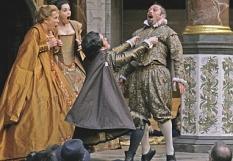Love's Labour's Lost Review 2007
The Globe's artistic director, Dominic Dromgoole, is back in the directorial driving seat in this latest offering from the theatre which soldiers on come rain or shine - and with the summer from hell to contend with, it's probably a good thing that they're used to coping with the British weather. However, there's not much military soldiering going on in the play itself as the King of Navarre and three of his lordly pals decide to forsake worldly pleasures and opt for a spell of solitary learning in order to improve their already noble minds. Signing contractual promises to avoid contact with women and to spend 3 years in scholarly pursuits, doesn't sound like much fun, but it's not long before oaths are cast aside when a French Princess fetches up with 3 of her beautiful attendants in tow.
'Love's Labours Lost' is a strange kind of play - more akin in many respects to panto. There are several 'plays within plays' in a similar vein to the mechanicals' play in 'A Midsummer Night's Dream'. In particular, there's the presentation of the '9 worthies' which could be more aptly described as farce. And there's a scene where all the noblemen - having abandoned their scholarly vows in favour of courting the women they've fallen in love with - dress up as Muscovites complete with enormous beards. On the other hand, the play contains exceptional wordplay and beautiful verse that reminds us, if any reminder were necessary, that Shakespeare was a master craftsman in the writing department.
The play is also a little unusual because there are no clearly defined lead roles. For example, you'd think that the King of Navarre and the Princess of France would have the biggest roles. In fact, both of those characters are somewhat dwarfed by their attendants - Berowne on the King's side, and Rosaline on the Princess's. Several of the minor characters spend considerable time in the limelight too. For example there's Don Adriano De Armado who speaks with a Spanish accent and can't quite get his brain round the complexities of the English language (I'm not sure I blame him).
Trystan Gravelle (Berowne) has a melodious voice thanks to his lilting Welsh accent. Though his diction is clear, his speed of delivery at the start of the play seemed rather frantic, though it thankfully slowed later on. Gemma Arterton plays Rosaline, Berowne's opposite number in the female camp. Arterton not only has considerable stage presence, but has the added advantage of being strikingly beautiful too.
Timothy Walker takes on the difficult task of defining the ludicrous Spaniard, Armado, and is largely successful, bringing a kind of wistful affectation to the character. However, there were times when he needed to pump up the volume a bit, even though he's obviously meant to demonstrate linguistic limitations. Armado's page, Moth, is played with eager, almost glowing personality by the petite Seroca Davis, and Paul Rider lent some dry, intellectual cynicism to the part of Boyet, the French Princess's attendant.
In his second season as artistic director, Dominic Dromgoole seems to have set something of a pattern. Half way through last year's season, he gave his team the chance to have a huge amount of fun with the quirky pirate comedy 'Under The Black Flag', and this season he's gone for the same kind of mid-season strategy with this oddly engaging comedy from the Bard. The Globe is often subjected to considerable critical flack for focusing on comedy, and it's pretty clear here that Dromgoole has milked 'Love's Labour's Lost' as much as he can, even to the extent that John Bett's curate loses his dignity by losing his pants. But it never seemed to me that the comedy here was forced or artificial, though it does at times border on the melodramatic. The final arbiters, of course, are the ones who braved the hideous British summer and handed over their hard-earned cash to see the play. They seemed to love it. Personally, I wouldn't go that far, but I certainly found it lively, entertaining and enjoyable.
The ending to this play is not quite what we might expect given the jollity of everything that's gone before. No marriages seal the comedic events, or give us the comfort of a happy ending. It suggests that Shakespeare wrote a follow-up play (Love's Labour's Won?) for which there is some intriguing documentary evidence, but still no sign of the actual script. Perhaps it was washed away in an Elizabethan summer like the one we're currently enduring.
What the popular press had to say.....
PAUL TAYLOR for THE INDEPENDENT says, "Zestful production succeeds in captivating the audience." THE FINANCIAL TIMES says, "Warhorse comedy is seriously over-egged. Most of the laughs come via visual gags, directorial invention and business from the players." KIERON QUIRKE for THE EVENING STANDARD says, "A particularly unengaging rendering." CHARLES SPENCER for THE DAILY TELEGRAPH says, "Laborious production."
External links to full reviews from popular press
The Independent
Financial Times
Daily Telegraph
Production photo by John Haynes
Originally published on
